
Journal AWWA
Scope & Guideline
Empowering Researchers and Professionals to Tackle Water Quality Issues.
Introduction
Aims and Scopes
- Water Quality and Treatment:
Research on improving water quality through advanced treatment technologies, monitoring, and management practices. This includes studies on removing contaminants such as PFAS, disinfection byproducts, and other organic contaminants. - Water Infrastructure Management:
Focus on the planning, design, maintenance, and financing of water utility infrastructure. This encompasses asset management, resilience strategies, and the integration of smart technologies to enhance system performance. - Affordability and Equity in Water Services:
Exploration of economic factors affecting water pricing and accessibility. Emphasis on strategies to ensure that low-income households can afford water services while maintaining utility sustainability. - Environmental Sustainability and Climate Resilience:
Investigating the impacts of climate change on water resources and the implementation of sustainable practices, including stormwater management and water reuse initiatives. - Public Engagement and Trust:
Research aimed at enhancing public understanding and trust in water services, addressing communication strategies, and fostering community involvement in water management decisions. - Emerging Technologies in Water Management:
Exploration of innovative technologies, such as artificial intelligence, machine learning, and digital twins, that can improve operational efficiency and decision-making in water utilities.
Trending and Emerging
- Cybersecurity in Water Utilities:
With increasing digitalization, there is a notable rise in research addressing cybersecurity challenges faced by water utilities, emphasizing the need for robust protection against cyber threats. - Water Reuse and Resource Recovery:
A growing emphasis on sustainable practices such as potable water reuse and resource recovery methods indicates a shift towards maximizing water resource efficiency. - Diversity, Equity, and Inclusion (DEI):
Research exploring DEI in the water sector is trending, highlighting the importance of inclusive practices and policies in ensuring equitable access to water services. - Climate Change Adaptation Strategies:
Emerging themes focus on resilience and adaptation strategies for water systems in response to climate change, reflecting the urgency of building infrastructure that can withstand environmental changes. - Artificial Intelligence and Data Analytics:
The integration of AI and data analytics in water management is gaining traction, showcasing innovative approaches to enhance operational efficiency and predictive capabilities in utilities.
Declining or Waning
- Traditional Water Supply Sources:
Research focusing on conventional water supply methods seems to be declining as discussions shift towards alternative sources, such as potable reuse and stormwater capture. - Aesthetic Water Quality Issues:
Topics related to taste and odor control in drinking water are becoming less prominent, possibly as utilities prioritize health-based water quality standards over aesthetic concerns. - Basic Water Treatment Processes:
The exploration of fundamental treatment processes appears to be waning, with more emphasis on advanced treatment technologies and their applications for complex contaminants. - Historical Water Management Practices:
Research reflecting on past water management practices is less frequent, indicating a shift towards forward-looking strategies and innovations in water governance. - General Water Conservation Strategies:
While important, conventional water conservation strategies seem to be overshadowed by more integrated approaches that combine technology, community engagement, and policy changes.
Similar Journals
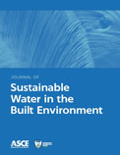
Journal of Sustainable Water in the Built Environment
Transforming research into actionable water policies.The Journal of Sustainable Water in the Built Environment, published by the American Society of Civil Engineers (ASCE), is a pivotal platform dedicated to advancing knowledge and practices in the fields of water resource management and sustainable infrastructure. Since its inception in 2015, the journal has adopted a rigorous approach to publishing high-quality research and reviews, as evidenced by its Q2 ranking in both Management, Monitoring, Policy and Law and Water Science and Technology categories as of 2023. With an ISSN of 2379-6111, the journal plays a critical role in shaping policies and innovative technologies that address the unique challenges associated with water sustainability in urban environments. Located in the United States, it attracts a diverse audience of researchers, professionals, and students focused on interdisciplinary solutions. Although it follows a traditional publishing model, the journal is committed to making impactful contributions to the academic community and beyond, fostering collaboration and knowledge exchange through its publications. Address all correspondence to 1801 Alexander Bell Dr, Reston, VA 20191-4400.

Water Resources and Industry
Transforming Research into Practical Water SolutionsWater Resources and Industry, published by Elsevier, stands at the forefront of research in the critical fields of water science and technology, as well as geography, planning, and development. With an impressive 2023 impact factor that places it in the Q1 category for both Geography and Water Science on a global scale, this journal is a vital resource for academics, professionals, and students seeking to advance their understanding of water-related issues impacting industries worldwide. Since its inception in 2013 as an Open Access journal, it has fostered innovative research and practical solutions to challenges in water resource management. Located in the vibrant academic hub of Amsterdam, the journal encourages submissions that cover a broad spectrum of topics, from sustainable practices and policy development to technological advancements in water treatment and distribution. By making its research publicly accessible, Water Resources and Industry not only contributes to scholarly discourse but also empowers stakeholders to implement evidence-based strategies for water sustainability, thereby enhancing its relevance and impact in today's world.
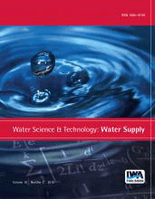
Water Supply
Connecting professionals through impactful research.Water Supply is an esteemed journal published by IWA PUBLISHING that plays a pivotal role in the field of water science and technology. With an ISSN of 1606-9749 and an E-ISSN of 1607-0798, this journal has been a key resource for researchers and professionals since its inception in 2001. Now covering a wide range of topics until 2024, it is recognized for its impactful contributions, holding a Q2 ranking in the Environmental Science: Water Science and Technology category, and currently stands at rank #125 out of 261 in Scopus, reflecting its relevance and influence in the academic community. The journal aims to disseminate significant research findings and innovations in water supply management, ensuring that professionals and students are equipped with the latest knowledge and practices in the sector. Despite not being an open-access journal, Water Supply continues to attract high-quality submissions that enhance our understanding and preservation of vital water resources. For those invested in sustainable water practices, this journal is an invaluable tool for continued learning and advancement.

ACS ES&T Water
Innovating solutions to global water challenges.ACS ES&T Water, published by the American Chemical Society, is a leading peer-reviewed journal focused on the interdisciplinary field of water science and technology. Since its inception in 2021, the journal has rapidly established itself as a prominent platform for research, boasting an impressive impact factor and ranking in the Q1 category across various disciplines, including Chemical Engineering, Chemistry, Environmental Chemistry, and Water Science and Technology. With a current Scopus rank of #66 out of 261 in Environmental Science and a remarkable percentile of 74%, ACS ES&T Water is dedicated to advancing the understanding of water-related challenges and solutions through high-quality research. The journal aims to facilitate communication among researchers, professionals, and policymakers by providing open access to innovative studies and methodologies that address critical issues in water resource management and sustainability. Collaborating at the intersection of chemistry and environmental science, this journal is essential for anyone invested in the future of global water security and innovation.
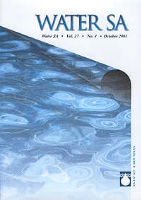
WATER SA
Advancing water science for a sustainable future.WATER SA, published by the WATER RESEARCH COMMISSION, serves as a pivotal platform for interdisciplinary research in the areas of water science and technology. With an ISSN of 0378-4738 and an E-ISSN of 1816-7950, this open-access journal has been committed to disseminating knowledge since 2005, ensuring that research is freely accessible to a global audience. As of 2023, it holds a Q3 ranking in several key categories including Applied Microbiology and Biotechnology, Management, Monitoring, Policy and Law, Waste Management and Disposal, and Water Science and Technology. These rankings reflect its significant contribution to these disciplines, particularly in South Africa where it is based. With a history dating back to 1976 and converging research efforts extending through 2024, WATER SA aims to illuminate pressing water-related challenges and foster innovative solutions through rigorous scientific inquiry. Researchers, professionals, and students interested in the sustainability and management of water resources will find its comprehensive portfolio essential for advancing their work and understanding in an increasingly critical field.
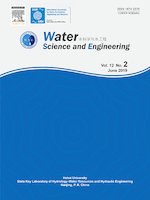
Water Science and Engineering
Elevating Water Engineering Research to New HeightsWater Science and Engineering, published by ELSEVIER, is a premier open access journal that has been disseminating vital research in the realms of civil and structural engineering as well as ocean engineering since 2008. With its ISSN 1674-2370 and E-ISSN 2405-8106, this journal plays a crucial role in advancing knowledge and innovation within the sector, evidenced by its impressive rankings in Scopus—holding the 15th position out of 105 in Ocean Engineering and 76th out of 379 in Civil and Structural Engineering, placing it in the 86th and 80th percentiles, respectively. Attaining a Q1 classification in both categories for 2023 highlights its importance and influence in the academic and professional communities. The journal addresses a broad spectrum of topics integral to water sciences, offering significant insights for researchers, professionals, and students alike. With a convergence period spanning from 2010 to 2024, it continues to explore contemporary issues and advancements, providing a pivotal platform for the dissemination of research. The journal is accessible to a global audience, reaffirming its commitment to fostering open access and enhancing accessibility to vital scientific literature.
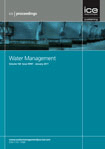
PROCEEDINGS OF THE INSTITUTION OF CIVIL ENGINEERS-WATER MANAGEMENT
Advancing Sustainable Solutions in Water ManagementPROCEEDINGS OF THE INSTITUTION OF CIVIL ENGINEERS-WATER MANAGEMENT is a prestigious journal published by Emerald Group Publishing Ltd, dedicated to advancing the field of water management within civil engineering. With an ISSN of 1741-7589 and an E-ISSN of 1751-7729, this journal delivers peer-reviewed research that spans the critical intersections of water science and technology, contributing valuable insights into sustainable water management practices. As evidenced by its ranking in the 2023 Scopus categories, where it holds the Q3 quartile in Water Science and Technology, and a respectable position among its peers, the journal remains a vital resource for researchers, professionals, and students in the field. Though it is not an open-access journal, it offers accessible subscription options that facilitate worldwide dissemination of knowledge, enhancing its role as a fundamental reference point for cutting-edge developments in water management. For those looking to publish or stay updated on the latest research trends, this journal serves as an essential platform for promoting innovation and sustainable practices in civil engineering and water resources management.

Blue-Green Systems
Bridging Ecosystems for a Greener TomorrowBlue-Green Systems is an esteemed journal in the realm of environmental science, published by IWA PUBLISHING. With an ISSN of 2617-4782, this journal serves as a vital platform for disseminating cutting-edge research on the integration of blue (water-related) and green (land-related) systems, focusing on sustainable solutions to pressing environmental challenges. Since its inception in 2019, the journal has rapidly established itself as a leader in the field, ranked in the Q1 category across three domains: Environmental Science (miscellaneous), Management, Monitoring, Policy and Law, and Water Science and Technology, with impressive positions of #25/261 and #22/219 in their respective Scopus Ranks. This remarkable visibility and high impact factor reflect its commitment to advancing knowledge in sustainable management practices and policies. Researchers, professionals, and students alike can access the journal's rich content to enhance their understanding of the integration between ecological and hydrological systems, pivotal for driving innovative strategies in environmental management. Based in the United Kingdom, Blue-Green Systems contributes significantly to the global discourse on environmental sustainability and innovation, making it an essential resource for those aiming to influence future policies and practices.

Water Practice and Technology
Advancing Knowledge for Global Water ChallengesWater Practice and Technology is a distinguished open-access journal published by IWA PUBLISHING, dedicated to disseminating cutting-edge research and practical insights within the field of water science and technology. With an E-ISSN of 1751-231X, the journal has been at the forefront of sharing knowledge since its inception in 2011 and has transitioned to open access in 2021, providing unrestricted access to high-quality research articles. Based in the United Kingdom, this journal plays a vital role in advancing the understanding of water resource management, treatment technologies, and environmental sustainability. As of 2023, it is categorized in the Q3 quartile for Water Science and Technology with a Scopus rank of #157/261, placing it in the 40th percentile among its peers. Researchers, professionals, and students alike will find the journal a valuable resource for the latest trends, innovations, and practical applications in the water sector, facilitating a collaborative approach towards addressing global water challenges.
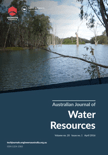
Australasian Journal of Water Resources
Exploring Innovative Approaches to Water ResourcesThe Australasian Journal of Water Resources, published by Taylor & Francis AS, stands as a pivotal resource in the field of water science and technology. With an ISSN of 1324-1583 and E-ISSN 2204-227X, this esteemed journal facilitates the dissemination of high-quality research articles that address critical issues facing water resources management across Australasia and beyond. Ranking in the Q2 category for Water Science and Technology as per the 2023 metrics, it boasts an impressive Scopus ranking of 75/261 in Environmental Science, placing it in the 71st percentile for its field. Spanning from 2008 to 2024, the journal emphasizes the importance of sustainable water practices, innovative technologies, and environmental policy, making it an invaluable asset for researchers, professionals, and students seeking to advance their knowledge and contribute to the discourse on water management challenges. The journal's rigorous peer-review process and commitment to open academic dialogue ensure that emerging trends and pioneering ideas receive the attention they deserve.